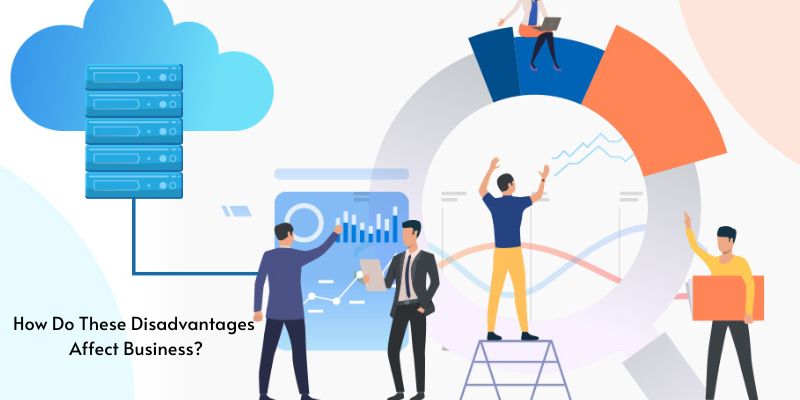The cost-prohibitive resources that the majority of small firms can’t afford to have on-site are made available via cloud computing on demand. Critical company data can be accessed from anywhere in the globe on any device thanks to the cloud, which eliminates the need for physical data storage devices and complex infrastructure. Although cloud computing has completely changed how businesses run, there are still certain difficulties and disadvantages with it. This article will explore the drawbacks of cloud computing providers so that you can evaluate cloud solutions for your company with greater knowledge.
Contents
How does cloud computing work?
A type of information technology (IT) known as “cloud computing” offers consumers on-demand hardware and software services. The ability to access services from anywhere and at any time is one of the most impressive aspects of cloud computing technology. regardless of the client’s location or device. It enables companies to access computational resources like servers, storage, software, and networks via the Internet. Additionally, requiring little to no engagement between enterprises and third-party vendors or cloud service providers.
Challenges With Cloud Computing Provider
Businesses can profit from the scalability, flexibility in setting up and managing their IT infrastructure, and pay-as-you-use business models provided by the revolutionary technology known as cloud computing. However, there are a number of drawbacks to cloud computing that provide difficulties for companies. These consist of:
Downtime
Only the Internet is used by businesses to access cloud computing provider services. Services are interrupted and downtime increases when there is an internet outage or poor connectivity. Therefore, cloud computing provider’s heavy reliance on the Internet is one of its main complaints.
Possibility of Attacks
In terms of data security, private clouds are thought to be the most secure for enterprises. Private clouds, however, are more expensive to set up than public, hybrid, and multi-cloud systems. The preference for public, hybrid, and multi-cloud computing services is widespread among enterprises. Due to the fact that these clouds offer services to several users through the same network, businesses are more susceptible to cyberattacks that could result in data loss or leakage.
Flexibility and Little Control
All cloud computing provider services in public, hybrid, and community clouds are fully managed by cloud service providers. Customers are given little autonomy and freedom as a result, which limits their access to a range of services and programs. As a result, many businesses sign individual end-user license agreements to take ownership of the cloud’s services and applications.
Lock-in of vendors
Vendor lock-in is a circumstance in which businesses utilizing cloud computing provider services from one vendor are unable to move to a different vendor. This frequently occurs as a result of expensive switching prices, significant amounts of difficult-to-migrate data, and several other complications. Companies are compelled to use a specific vendor’s services when there is vendor lock-in. Their operational process and efficiency are impacted by this.
Cost sensitivity
The cost of cloud computing provider is both a big benefit and a big drawback. While it enables small businesses to access high-quality services without spending a lot of money on IT infrastructure, it can also lead to a rise in costs for businesses because there are a number of unintended expenses associated that only become apparent afterwards. These expenses include those related to data transport, cloud use, and data migration.
Dependence on Internet Access
It’s vital to keep in mind that while cloud computing provider is all about riding internet waves, firms that have erratic or slow internet connections may experience outbreaks. The ability to access and use cloud services efficiently may be hampered in areas with poor internet connectivity or frequent outages.
To assure continuous access to vital cloud resources, you must have a backup strategy, other connectivity choices, or even invest in upgrading your internet infrastructure, if you want to stay afloat.
Risks to Privacy and Data Security
When you keep sensitive information on the cloud, especially when it’s client data, you’re giving a third party provider the keys to your house. It makes sense that you might be concerned about data security, potential data breaches, and illegal access. It’s similar to having a modern safe.
The encryption techniques, access controls, and compliance certifications of a cloud provider should be carefully examined in order to minimize risks and keep your data locked up tight in the cloud, despite the fact that there are very few data breaches on the cloud.
How Do These Disadvantages Affect Business?
While cloud computing provider makes operations more efficient, there can also be drawbacks that result in businesses paying money they don’t need to, losing sensitive information, and spending a lot of time managing their cloud footprint.
Due to the strong data privacy rules in many nations, businesses that keep and process the personal information of their consumers must implement strict data security frameworks. Companies suffer significant financial losses and erode client trust as a result of data breaches. As a result, a lot of businesses are voicing their worry about regulatory compliance with cloud computing provider. Companies are compelled to select additional data protection and compliance procedures that dramatically raise their annual expenditures since they are unable to fully depend on the security frameworks of cloud service providers.
Companies are more exposed to attacks due of the Internet’s cloud computing provider footprint. A company’s cloud footprint offers a roadmap of its strategy for leveraging cloud services online. Hackers can monitor the footprints of cloud services and attack cloud servers, causing confidential data leaks. This problem is particularly pronounced in public data clouds since there are more users on the network and more third parties engaged.
Despite the fact that cloud computing has a lot to offer organizations, it’s important to be aware of the potential drawbacks and difficulties connected with cloud computing provider. These drawbacks can be successfully managed and planned for, enabling businesses to take use of cloud computing’s benefits for enhanced productivity and scalability.





